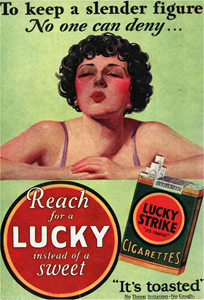
New Study: tobacco companies spiked cigarettes with diet aids to hook people worried about weight
It's been nearly a century since Lucky Strike first used the slogan "Reach for A Lucky Instead of A Sweet" and decades since the early Virginia Slims advertising campaign depicted women who smoke as independent, stylish, sexy — and of course slim — to market to women and girls.
But slogans and sophisticated images weren't the only tricks in the tobacco industry's scheme to keep people smoking.
According to a new study published in The European Journal of Public Health, the companies added appetite suppressants to cigarettes "to enhance the effects of smoking on appetite and body weight" — and to stoke smokers' fears of gaining weight if they quit.
"We found clear evidence that every one of the six U.S. and U.K tobacco companies elaborated the idea to put appetite depressants molecule [sic] inside cigarettes to enhance this effect," the researchers wrote. At least two companies — Philip Morris and British American Tobacco — modified their products "to affect appetite and body weight."
The researchers studied industry documents released with the 1998 settlement of U.S. state lawsuits against the tobacco companies. Previously disclosed documents have showed the lengths to which the big tobacco companies went to get women and girls to smoke — and keep smoking.
Women smokers, the industry knew, were most likely to want to be skinny even if they understood that by smoking, they risked getting sick.
"As a matter of fact, advertisements in magazines is the most efficient way to talk to these female smokers," a 1993 Philip Morris document states. "… Actually, one of their main … values is to look attractive. In other words, a woman cannot be attractive if she is fat."
The industry's targeting of women and girls continues. In 2008, Philip Morris announced the makeover of its Virginia Slims brand into "purse packs" — small, cosmetic-like packs that contain "superslim" cigarettes. In January 2007, R.J. Reynolds launched its Camel No. 9 cigarettes pitched to the "most fashion forward woman."
Under the new law giving the Food and Drug Administration the authority to regulate tobacco products in the United States, tobacco companies must disclose to regulators changes, including the introduction of additives, that are made in cigarettes.
No more doctoring them with diet aids. And less ability to exploit the pressure women feel to be thin.
http://www.tobaccofreekids.org
It's been nearly a century since Lucky Strike first used the slogan "Reach for A Lucky Instead of A Sweet" and decades since the early Virginia Slims advertising campaign depicted women who smoke as independent, stylish, sexy — and of course slim — to market to women and girls.
But slogans and sophisticated images weren't the only tricks in the tobacco industry's scheme to keep people smoking.
According to a new study published in The European Journal of Public Health, the companies added appetite suppressants to cigarettes "to enhance the effects of smoking on appetite and body weight" — and to stoke smokers' fears of gaining weight if they quit.
"We found clear evidence that every one of the six U.S. and U.K tobacco companies elaborated the idea to put appetite depressants molecule [sic] inside cigarettes to enhance this effect," the researchers wrote. At least two companies — Philip Morris and British American Tobacco — modified their products "to affect appetite and body weight."
The researchers studied industry documents released with the 1998 settlement of U.S. state lawsuits against the tobacco companies. Previously disclosed documents have showed the lengths to which the big tobacco companies went to get women and girls to smoke — and keep smoking.
Women smokers, the industry knew, were most likely to want to be skinny even if they understood that by smoking, they risked getting sick.
"As a matter of fact, advertisements in magazines is the most efficient way to talk to these female smokers," a 1993 Philip Morris document states. "… Actually, one of their main … values is to look attractive. In other words, a woman cannot be attractive if she is fat."
The industry's targeting of women and girls continues. In 2008, Philip Morris announced the makeover of its Virginia Slims brand into "purse packs" — small, cosmetic-like packs that contain "superslim" cigarettes. In January 2007, R.J. Reynolds launched its Camel No. 9 cigarettes pitched to the "most fashion forward woman."
Under the new law giving the Food and Drug Administration the authority to regulate tobacco products in the United States, tobacco companies must disclose to regulators changes, including the introduction of additives, that are made in cigarettes.
No more doctoring them with diet aids. And less ability to exploit the pressure women feel to be thin.
http://www.tobaccofreekids.org
 RSS Feed
RSS Feed

